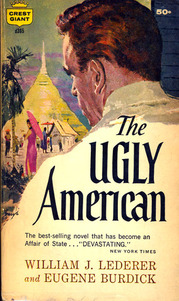
Lederer and Burdick were, in their geopolitical context, a solid 5-star read, so I did a review on Goodreads
https://www.goodreads.com/review/show/1016746356, copy-pasted below.
Rafeeq
The Ugly American by William J. Lederer and Eugene Burdick is lifelike and rich, a sometimes wry and ironic panorama of the mid-1950s ideological and military front lines of the Cold War drawn, we are informed in the Epilogue, often almost directly from the authors' own experiences in Southeast Asia. Though it thus is fictionalized, the book--I would not quite call it a novel, really, as the characters are so disparate, and only a few of them turn up here and there throughout--reads with the veracity of a diary or a journalistic account. Sometimes the events and characters portrayed are cringe-worthy in the extreme, but we know very well that such arrogance, such blindness, such bombastic buffoonery were far from uncommon; indeed, the Epilogue explains, point by point, exactly how close certain little anecdotes are to the truth.
The back cover of my 1961 Fawcett Crest edition of the book asks, in boldface type, "Is President Kennedy's 'PEACE CORPS' The answer to the problem raised by this book?" Perhaps so. Certainly the colonial French and the American diplomats who didn't bother learning the language or culture of the region did not seem to do much to keep the dominoes from toppling. While Lederer and Burdick do not appear to have noticed the long-term damage done by United States support of any ol' dictator so long as he was anti-Communist, and by shenanigans such as the U.S.-orchestrated coups in places such as Iran and Guatemala, they on the other hand probably do not exaggerate the dirty tricks and the viciousness of the other side.
It would have been interesting to explore a little more deeply exactly what, aside from legitimate anti-colonial sentiment and ginned-up anti-Western propaganda, motivated the average Communist guerrilla. Perhaps, though, this is a bit much to ask of a piece published so soon after the fall of besieged Dien Bien Phu, when it urgently appeared that with the right kind of effort, shoring up Indochina would prevent the fall of further nations all the way back to Africa. The authors do, however, at least show with care the motivations of a disparate host of well-meaning and motivated characters on this side of the Bamboo Curtain, whether religious or military men or idealistic rather than opportunistic diplomats, trying their best to help free peoples live as they themselves choose. Could these amiable folks willing to live in the boondocks, eat the food, learn the language, and share and communicate instead of impose from above really make a difference? Very possibly, at least when measure by goodwill on the ground rather than by the speeches in the national capital; with luck, they at least can help offset the damage of the stuffed shirts and the fools.
Lederer and Burdick's vivid snapshot from the height of East-West sparring, when the Soviet occupation of Eastern Europe, the Berlin Blockade, the fall of China, and the bloody Korean War were threats seen in contemporary headlines rather than mere chapters in a history textbook, is politically dated, of course. The places the authors wrote about, the seemingly clear-cut ideologies, the pressing national issues--such things now have been settled decades ago. Nevertheless, The Ugly American reminds us, long after the brushfire conflicts of the Cold War have burned out, of the fundamental human values of courage, respect, and friendship, whose worth certainly does not diminish.
4 August 2014
 RSS Feed
RSS Feed
